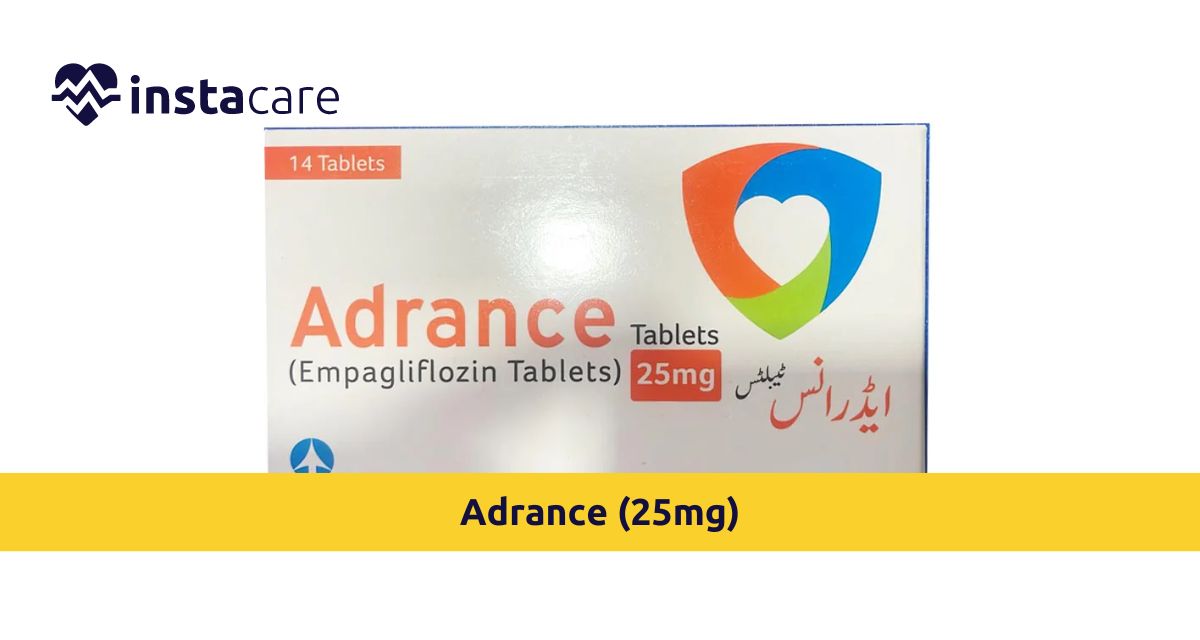It is for this reason that each drug is
necessary to be known to professionals and patients so as to use it safely and
effectively. Adrance is therefore one of those drugs highly regarded with major
concerns regarding its benefits, uses, and risks of use. It follows that you
are a patient prescribed this medication or a professional health worker who
would want to consider it for treatment, so you will have to be on the proper
note on how Adrance works. The following blog will help impart overall
information in connection with Adrance 25mg with regard to its benefits, common
uses, and possible risks so that readers can come to an informed decision about
its use.
What Is Adrance?
Adrance is a brand drug, the active substance in which is an antidepressant. The drug is used in the treatment of major depressive disorder, manifested as one's mood state, and, of course, it goes hand in hand with extreme feelings of sorrow and a lack of interest in carrying out activities. Sometimes, Adrance is used against some disorders of anxiety. Antidepressant belongs to the class of serotonin and norepinephrine reuptake inhibitors, or SNRIs.
Adrance works by increasing the levels of some
chemicals in the brain called serotonin and norepinephrine. Since serotonin and
norepinephrine are naturally involved in the regulation of mood, Adrance
changes the balance to positively improve a person's mood and decrease symptoms
of depression, leading to better well-being and a more positive outlook toward
life.
Here Are Various Benefits Of Adrance
1. Proven Treatment For Depression
The benefits of Adrance are mainly
associated with being highly powerful in treating major depressive disorder.
Clinical studies point to the fact that antidepressants is unusually effective
when it comes to reducing symptoms associated with depression. These include
continuous feelings of sorrow, loss of interest in daily activities, and
unusual fatigue. By treating these symptoms, Adrance reduces depression mainly
increases the quality of life and lessens functionality.
2. Improvement In Anxiety Symptoms
Besides depression, Adrance is indicated in
the case of symptoms of anxiety. In fact, most of the patients who are
diagnosed with major depression also complain of high levels of anxiety, and
SNRIs can perform a dual action that enables both pathologies to be treated
consecutively. This can reach a more balanced state of mood with the least
possible sensation of nervousness or panic.
3. Better Profile In Comparison To Serotonin Reuptake Inhibitors (Ssris)
Adrance is an SNRI, and its mechanism of
action is through some unknown routes as compared to the well-known serotonin
reuptake inhibitors and tricyclic class of antidepressants. Some patients
respond to SNRIs, or the side effects may be less, as compared to other classes
of antidepressants. It is indicated when SSRIs fail to produce a positive
response in patients or when the SSRIs are intolerable.
Indications For Adrance
1. Major Depressive Disorder (MDD)
Major depressive disorder is a leading
illness for which Adrance is prescribed. It is the feeling - more or less, of
badness or not feeling so good about oneself. The sustained low mood alongside
the loss of interest makes it very difficult to carry out day-to-day activities
or even work. Adrance works on balancing neurotransmitters in the brain,
reducing these severe symptoms.
2. Generalized Anxiety Disorder (GAD)
Although this is not a first-line treatment
for generalized anxiety disorder, Adrance is occasionally used in such
examples, especially in patients with anxiety as a prominent component of their
depression. It decreases excessive worry and somatic symptoms of anxiety.
3. Other Off-Label Uses
Off-label uses would be treating something
like neuropathic pain or even migraines because it affects neurotransmitter
levels. Such uses are not always approved by the FDA and must be prosecuted
with caution.
View More: Essential Aspects To Know About Atarax 25mg - Importance Risks Uses Benefits
Risks And Side Effects Of Adrance
1- Side Effects
Like any medication, Adrance is known to produce side effects. Most commonly reported are:
- Nausea: This is one of the common problems that new users have and tends to subside over time.
- Dry Mouth: Patients may experience a dry or sore mouth.
- Dizziness: Some patients experience light-headedness, especially when standing up quickly.
- Sweating: Some patients develop excessive sweating.
- Fatigue This is very common and occurs in the initial few weeks of treatment mostly.
2- Serious Side Effects
Besides the usual side effects of Adrance,
it may also produce very serious reactions, namely:
- Raised Blood Pressure: SNRIs can increase blood pressure. Blood pressure should be regularly monitored.
- Serotonin Syndrome: This is a very unusual, but sometimes a fatal problem that is a result of very high levels of serotonin in the body. Symptoms include confusion, rapid heartbeats, increased blood pressure, and stiffness of muscles.
- Suicidal Thoughts: It is associated with an increased risk of suicidal ideation following its use, as is common with many other antidepressants, in particular with younger patients. Symptoms precipitated by removal of Adrance are withdrawal reactions manifested by dizziness, gastrointestinal symptoms, irritability, and headaches.
When the drug needs to be withdrawn, it
should be done by decreasing in size and not abruptly.
Precautions And Drug Interactions
1. Underlying Diseases
Adrance should be administered cautiously
in cases of hypertension, Liver disease. and renal impairment, and the presence
of convulsive disorders. Dosage adjustment and additional monitoring are
recommended.
2. Drug-Drug Interactions
Adrance will interact with other drugs by
enhancing the probabilities of side effects, on one hand, and might diminish
the efficacy of the treatment course being followed, among other interactions.
Here, some major interactions are listed:
3- Monoamine Oxidase Inhibitors (Maois)
Using Adrance simultaneously with MAOIs is
not recommended, as it can result in serious, potentially deadly reactions.
4- Blood Thinners
Adrance can increase the risk of bleeding
acting in combination with anticoagulant or antiplatelet agents.
5- Other Antidepressants
When other antidepressants, such as SSRIs
or other SNRIs, are used at the same time, there may be a rise in side effects
related to the class, such as those associated with SSRIs, or an imbalance of
receptors that results in increased serotonin levels.
Monitoring And Managing Treatment
Careful observation by a doctor is
necessary to track Adrance's advantages and potential drawbacks. The patient may
report a clear provocation of signs and symptoms, or they may present with
worsening problems. It is important to regularly monitor vital signs and to
report any new or worsening symptoms right away.
Conclusion
Since it helps to reduce the main symptoms
of anxiety and depression, Adrance 25 mg is highly helpful for treating major
depressive disorder and generalized anxiety disorder. As a result, it has
proven beneficial for a large number of patients. It has risks and adverse
effects that need to be watched, just like any other medication. In order to
have the best outcomes possible when treating anxiety and depression, this can
assist both the patient and the healthcare provider in having a proper grasp of
this medication.
Please book an appointment with the best Cardiologist in Lahore, Karachi, Islamabad, and all major cities of Pakistan through InstaCare, or call our helpline at 03171777509 to find the verified doctor for your disease.










